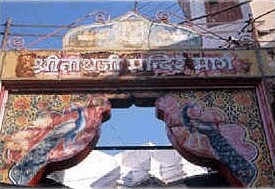Shrinathji Temple


Shrinathji Temple is a hindu temple dedicated to Shrinathji in Nathdwara. It is considered an important pilgrimage centre by Vaishnavs.
The Swarup or divine form of Shrinathji is said to be self-manifested. The idol of the Lord Krishna was moved during the late 17th century to what is now known as Nathdwara, Rajasthan from Govardhan during a time of social and economic upheaval in the region. When the idol reached the spot at village Sihad or Sinhad, the wheels of bullock cart in which the idol was being transported sank axle-deep in mud and could not be moved any farther. The accompanying priests realised that the particular place was the Lord's chosen spot and accordingly, a temple was built there under the rule and protection of the then Maharana Raj Singh of Mewar. Shrinathji Temple is also known as 'Haveli of Shrinathji’ (mansion). The temple was built by Goswami priests in 1672.
According to the hagiography of the Pushtimarg, Shrinathji used to travel to Mewar to play chaupar (an antecedent to Parcheesi) with a Princess by the name of Ajab Kunvari. She was upset whenever her beloved Shrinathji would go back to Vraj and asked him to stay with her in the palace. Lord Shrinathji said that one day, when the time was right, he would re-locate to Rajasthan.
Presently, Shrinathji's worship is performed by direct male descendants of Vallabhacharya in a haveli (lit. palatial home) in Nathdwara, Rajasthan. Economy and livelihoods in Nathdwara town revolve around the Haveli, the term used for the temple probably because it was situated in a fortified mansion, or Haveli, once a royal palace of the Sesodia Rajput rulers of Mewar.
Shrinathji was quite popular with other medieval devotees, as well, as there were preachers who founded Shrinathji temples in present-day Pakistan (Dera Ghazi Khan). This was done by Shri Lalji Maharaj and his deity of Shri Gopinathji and Shri Dauji of Dera Ghazi Khan, earlier a part of undivided India and not far from here. Shrinathji was even worshiped as far away as Russia (in the lower Volga region) and other places on the Central Asian trade routes. Tradition holds that Shrinathji would return to Govardhan some day with a new temple at Puchri in Govardhan.